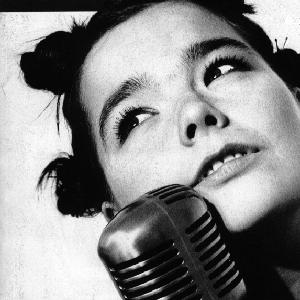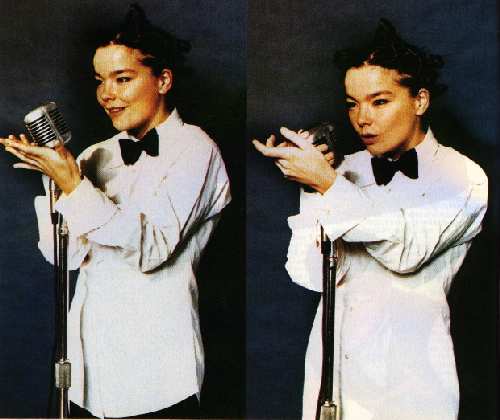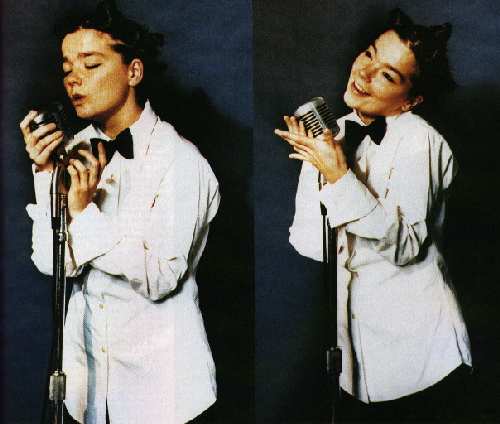TimeOut 11/8/1996
Arctic RoleText by Laura DaviesPhotographs by Lorenzo AgiusLinks to /rho
|
|
For those who never thought Sugarcubes were anything more than something sweet you gave up for Lent, and those who lost touch with the Icelandic indie-pop band when the promise of their first few enchanting singles got lost in three on the whole rather disappointing rock albums, the appearance of Björk's little face in not just the music press but Vogue as well, and her stunning new dance-pop sound on television and even Radio 4's 'Woman's Hour', might need some explaining. It comes as a bit of a shock to Björk herself. "I'm very surprised by the success of the album," she manages to say between the sneezes and sniffles. "I thought this album was kind of withdrawn, sort of backwards a bit." She had rather expected her own individual project (her first solo album outside Iceland) to get even less of the red-carpet treatment than the Sugarcubes' minor-league offerings had. Instead, acclaim has been almost unanimous. Like Sade's first album, and kd lang's latest, 'Debut' is the kind of record that will eventually find itself in almost everyone's living room. It's a magical work of superb musicianship and inspired lyricism. It's going to be one of those you-must-give-me-the-recipe albums - the kind of tip you pick up round at someone else's house, rather than the hype you're force-fed from poster campaigns. Naturally enough, Björk is fiercely proud of 'Debut', but has mixed feelings about its runaway success. She dismisses it simply as something she had to do before she died ("kind of thing"). "It was now or never. I owed people things," she continues in her trilling Arctic tones, after another cracking blow on her tissue. "I led a very happy life in Iceland. I was a housewife, working casual jobs, went on tour once in a while with the Sugarcubes (which was a bit of a joke, really, because we didn't really take ourselves seriously). I could've quite happily lived like that forever after. And after a hard day's work, you kinda sit down, have a glass of red wine, put your favourite tape on, read a brilliant book or see a brilliant film that saves your life, y'know? And all those people who've gone out of their way to make those things - like the perfect cheese, or the comfortable chair - you just sit there and enjoy it all. And I think it's not fair. You kind of owe it to the world to try once and do what you're best at, whether it's shoe-making, cookie-baking, electricity, or singing."
So the 27-year-old singer snapped out of her Icelandic way of life, moved to London with her seven-year-old son Sindri and got down to making 'Debut'. A month after the album's release, with the second single and a support slot to U2 imminent, the accolades are still coming. "Of course I'm very honoured, espe- cially because it was my own little album of just the things I like. But sometimes you so badly want something else and you need to get that first. Say it's a number, like 5.7, and you're at 1.2, then suddenly you get 9.8 and you wanna get that 5.7. Everyone thinks you're really ungrateful, 'cos you got 9.8 and you should be very happy, but it's a bit tricky." Björk has a very clear, level-headed way of looking at things, even if her point of view is 90 degrees off centre from the mainstream. The product of a hippy upbringing in rural Iceland; she puts her eclectic taste in music, film and books down to a privileged position passing between parents, grandparents and school, where everyone believed their ideas were most definitely the right ones, "and everyone else were idiots". Even at home people used to think Björk looked "a bit foreign"; in England her accent, and her features, set her apart again, but it's something she's used to. She might have given up using her surname (Guðmundsdóttir) because it saves a lot of time and trouble correcting people, but her patience with those who have tagged her (however affectionately) an Icelandic pixie is saintly. It's fair enough that a childhood living in purple-painted apartments might make great copy, but there has been a distinct hint of patronisation - 'good for a foreign person' - about the rave reviews. "I think that's more a British than an American thing. Americans tend to like things that are not what they see every day, they're even a bit addicted to it - their Minnie Mouses, Donald Ducks, "Star Wars". But the British are more conservative. They've also got this Impe- rialist way of thinking. It's just very hard to explain to a British person, I've got a British boyfriend and he kind of almost doesn't get it when I explain. It's like sexism, it's so deep that you don't realise it, and the biggest sex- ists, they are the ones who think they're not. It's the same with British people. They're so sure that they're much better, they don't even think about it. They tend to treat other people like rarities, like something you should keep in a box and put in a museum. They don't deal with them as equals with feelings. You can see that a lot in their films, how they portray Indians and Chinese people. It's kind of like something pretty to look at and then throw away. An object, like a rhino's skull from Africa. That manifests itself in the rock business as well, you know. They take someone like Ofra Haza... I guess I've been caught up in that as well." Björk does, however, feel a responsibility to Iceland, in the light of this unanticipated apreciation. The British success of her album is the biggest news back home since an Icelandic girl won several medals at the disabled Olympics many years ago. "It's a bit like Wales. If they won a gold medal in the Olympics, everybody would go drunk for a month." Still, Björk was rather hoping this piece of her history would be the kind of artefact someone might find at the back of a second-hand record shop in ten years' time, take home, and. be pleasantly surprised by. As it turns out, she's made the kind of sophisticated pop, soul, jazz and dance collaboration that someone like Lisa Stansfield would probably give her broad Rochdale accent for. Björk shuffles on the sofa, embarrassed, and snuffles into her disintegrating hanky. "I've always been very anti-style. Music has got nothing to do with style, it's a question of sincerity. So I wanted to make it irrelevant what style was used. It's just like a jumper and a pair of trousers. When you meet a person, you try to find out what the person is about. What she's wearing doesn't matter. The songs were what mattered, and they could have anything they wanted. It didn't matter if they needed a 20-piece brass orchestra from Bombay, or a trombone player from Kent. Journalists see all these different styles as a statement, but why I was doing it was to make that invisible, to make the songs more visible."
Björk might be somewhat bemused by the faith her record company (One Little Indian) has put in her voice, and the attention being paid to her record, but at least she now has the best producers and musicians at her disposal. She worked closely on the album with Nellee Hooper (who was heavily involved in creating the highly influential Soul II Soul sound), longtime co-conspirator Graham Massey of 808 State, and a host of top instrumentalists like Talvin Singh, and vocalist Jhelisa Anderson (oft associated with The Shamen). Mick Hucknall has recorded a remix of her new single, the enchanting ballad `Venus As A Boy', and Annie Lennox video director Sophie Mueller has produced the promo for it. It's the one perk of the job that makes the promotional hassle and bouts of illness worthwhile. Her latest treat is the impressive band line-up she's rehearsing to tour with. "I've got seven people, and each one is like a treasure on its own." She might look 12 years old (in fact, she'd already recorded her first album by that time), but her wide knowledge of jazz and blues, and her involvement with the current club scene are the reasons her album is so good; it's not some cobbled-together record company gimmick to relaunch her voice. "There are a lot of really good things going on in England. Especially the generation of 18-to 23-year-olds. They're very enthusiastic, very positive - musically, and attitude-wise as well. It's not muso." She blows her nose and from somewhere between her nostrils and the last scrap of dry tissue, it sounds like someone's grinding some very hard nuts. "Before me were the Woodstock generation. Their roots were in rhythm and blues. My generation have our roots in jazz. Not that we're actually playing jazz, but it's just kind of Lego - building blocks we get to make things out of. Like, chord-wise, musically, that's definitely where I come from. There are a lot of people of my generation making jazzy-house, jazzy-punk, jazzy-techno, whatever. A lot of these jazzy, funky sort of people are playing in London, like, really live. A lot of people who were play- ing when I was brought up were misunderstanding jazz, in an academic way. They just thought jazz was like a formula, which is rubbish. Young people now are playing jazz when they don't even know a note, 'cos they like the sounds, 'cos it's in their blood." Björk doesn't go clubbing every night, but she keeps in touch with the scene. She puts it down to her never-ending search for the perfect song to save her day. "I don't really give a fuck where that song comes from. But I don't think the DJs are taking as many risks, they're playing safe 'cos there's so much competition. Nowadays you have to wait till seven o'clock in the morning, when the DJs stop playing for other people, and start playing for themselves. 98 per cent of music is crap, but you have to try 98 times, so the ninety-ninth time it works." Three years ago she recorded an album of jazz standards back home, and put down the Jimmy Van Heusen classic, `Like Someone In Love' - in her own soaring style - for this album. Although her voice always did seem wasted on indie music - no matter how outlandish the Sugarcubes' version of that was - no one could've expected the classic sound she has produced for this album. Its best songs - the new single, and the haunting 'Come To Me' - are the most recently written, which bodes well for a healthy future. In the meantime, Björk is settling into her
Little Venice home with son and boyfriend.
She decided to move to London when her son
started school in Iceland last autumn. Björk
was used to being able to take her son with her
(he'd been on tour with the Sugarcubes since
he was one), and suddenly the separation
whenever she had to go away on business was
too much. She decided to make a home in a
place where she could work and he could go to
school. "Kids are so excellent,"
she laughs. "He
has been the bravest of it all, and he's right
into it. His English is better than mine!
"I haven't really got into it yet. I moved here
in January and I've just been so busy since. I'll
probably wake up in a year's time. Obviously I
know the luxuries - coming from a small
village in such an isolated country, where it
takes you a month to earn an aeroplane ticket
away - of being able to see whatever film you
want, eat every food, buy any book or record.
But especially in my job, I can find almost any
musicians in the world, 'cos it's such a meeting
point. That's what I enjoy more than the fact
that it's British, or English. I still haven't really
gotten into that. I think it's because the culture
is just so different from my character - it's
conservative, traditional, all these cliches. I'm
kind of the opposite: I like things that are
spontaneous, unplanned, raw, risky, instinctive,
not brainy." 'Debut' is out on One Little Indian Records.
'Venus As A Boy' is out Aug 23. She plays the
Forum on Aug 19, and supports U2 at Wembley Stadium, Aug 21.
|


